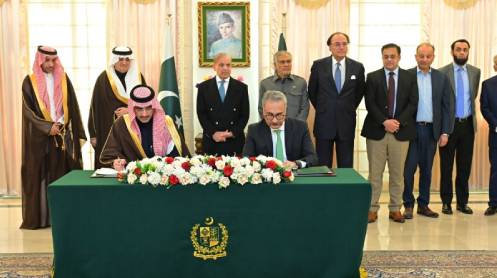Islamabad: In a significant development aimed at stabilizing Pakistan’s economy and ensuring a steady supply of petroleum products, the Kingdom of Saudi Arabia (KSA) has signed a Memorandum of Understanding (MoU) with Pakistan for a $1.2 billion Saudi Oil Facility (SOF) for one year.
Under the agreement, Saudi Arabia will provide Pakistan with deferred oil payments at a 6% markup, with the facility expected to become operational in March 2025. This arrangement will help Islamabad meet its external financing obligations under the International Monetary Fund’s (IMF) $7 billion Extended Fund Facility (EFF). An IMF review mission is set to visit Pakistan later this month or in early March 2025 to assess progress on the first six-month review under the EFF program.
Key Developments:
The SOF will disburse $100 million per month, allowing Pakistan to bolster its foreign exchange reserves and meet its import bill for three months.
The previous Saudi oil facility expired in December 2023, prompting Islamabad to request a renewal. The new SOF was included in Pakistan’s external financing commitments under the IMF agreement.
Additional MoUs were signed, including a $41 million Gravity Flow Water Scheme for Mansehra and an initiative to export skilled Pakistani labor to Saudi Arabia.
Federal Minister for Economic Affairs Ahad Cheema confirmed the agreement, stating, “Yes, Saudi Arabia has agreed to provide $1.2 billion in deferred oil payments for one year.” However, he did not specify an exact start date for the SOF.
Meanwhile, both countries are advancing negotiations on the Reko Diq mining project, with Saudi Arabia expected to acquire an initial 10% stake, which may increase to 20% in the future. The deal is anticipated to be finalized in the coming months.
Prime Minister Shehbaz Sharif Witnesses Agreement Signing
Prime Minister Shehbaz Sharif attended the signing ceremony for the SOF and a $1.61 billion loan agreement for the Gravity Flow Water Supply Scheme, which will enhance access to clean drinking water for 150,000 residents of Mansehra. The initiative aims to serve over 201,000 people by 2040, improving public health and quality of life.
A delegation from the Saudi Fund for Development (SFD), led by CEO Sultan Bin Abdul Rehman Al Marshad, met with Prime Minister Shehbaz Sharif at the PM House. The premier expressed appreciation for Saudi Arabia’s ongoing support in areas such as health, energy, infrastructure, and education, particularly in post-flood reconstruction efforts.
The SFD delegation also discussed ongoing projects, including the Mohmand Multi-purpose Hydropower Project, Golan Gol Hydropower Project, and Malakand Regional Development Project. The Saudi leadership reaffirmed its commitment to supporting Pakistan’s green energy and infrastructure projects.
Inflation Falls to Nine-Year Low at 2.4%
Pakistan’s inflation rate dropped to 2.4% in January 2025, marking its lowest level in over nine years, according to the Pakistan Bureau of Statistics (PBS). This is a sharp decline from 28.3% recorded a year earlier and 4.07% in December 2024.
Key highlights of the inflation report:
Urban inflation stood at 2.7%, while rural inflation fell to 1.9% in January.
Core inflation, which excludes food and energy prices, declined to 7.8%, down from 8.1% in December.
The decline was driven by lower food prices, improved supply chains, and a stable rupee.
Inflation peaked at 38% in May 2023 before entering a sustained decline.
The IMF projects Pakistan’s average inflation at 9.5% for FY2025, significantly lower than 23.4% in FY2024. However, global energy price fluctuations and currency volatility remain potential risks.
Despite lower inflation, Pakistan’s real interest rate stands at 9.6%, with the State Bank of Pakistan’s (SBP) policy rate at 12%. Economists warn that prolonged high interest rates could hinder economic recovery and increase fiscal pressures, as debt servicing consumes a major portion of government revenue.
Finance Minister Muhammad Aurangzeb, in a meeting with the SFD CEO Sultan Bin Abdul Rehman Al Marshad, highlighted Pakistan’s macroeconomic stability and emphasized the importance of Saudi investments. The discussion also included training programs for Pakistani skilled workers, aligning with Saudi Arabia’s growing labor market needs.
Prime Minister Shehbaz Sharif welcomed the continued decline in inflation, stating, “The government’s economic policies are on the right track, and we remain committed to further reducing inflation and improving the lives of our citizens.”
Story by Mehtab Haider & Muhammad Anis & Israr Khan





